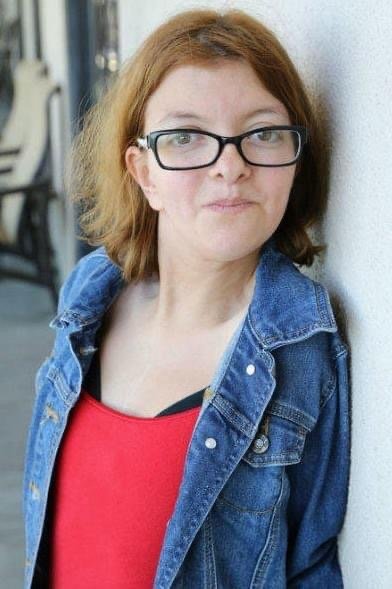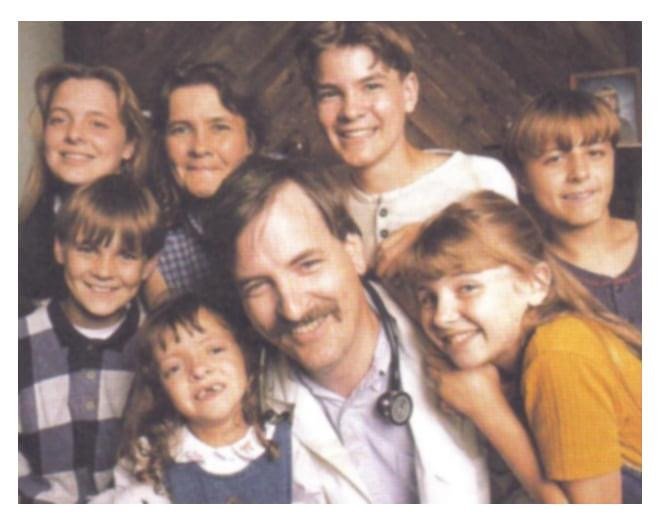Our Daughter Becca Is an HCBS Success Story: Let’s End Waiting Lists Now! (by Ann Yurcek)
Becca today. [image description: A young woman with light skin and shoulder-length red-brown hair poses on a porch. She wears a blue denim jacket over a bright red shirt. She wears thick-frame black eyeglasses.]
My daughter Becca is thirty-two years old. She volunteers at a stable where she’s been riding horses since she was eight years old. She’s training her golden retriever puppy, Lexie, as her service dog, and she’s helping her brother learn tools to assist with his low vision, a condition she shares.
Becca has complex medical needs and disabilities, but thanks to the support of Medicaid Home and Community-Based Services (HCBS), Becca is able to direct her own care and decide where she wants to live. She’s hired her own employees through supported decision making. Becca would never have survived a nursing home outbreak of Covid-19. She has become a strong advocate for herself and for others who should have the chance to live in their communities.
We have come a long way in developing care systems for our most medically complex and disabled children and adults. But it wasn’t always that way. Even now, many have not had the opportunities that help Becca. Too many are still on years-long waiting lists for HCBS.
When Becca was born in 1989 she spent the first six months of her life in the neonatal intensive care unit (NICU). We later learned that she has Noonan Syndrome, a genetic disorder affecting the heart, skeleton, and other other systems. Becca has heart, airway, lung, gastrointestinal, lymph, and immune system issues. At two-and-a-half months old, she experienced her first code blue.
We quickly learned that the hospital was the worst place for an immune-compromised child. Fortunately, Becca’s medical team helped us apply for one of just 200 Community Alternative Care (CAC) waiver slots in Minnesota, and she was one of the first babies out of the children’s hospital to have an Individual Family Service Plan (IFSP). She was supported at home with caregivers, therapies, and nursing.
Later, after our private insurance denied Becca care due to preexisting conditions (this was before the protections of the Affordable Care Act), and our family had fallen into poverty to cover her catastrophic medical bills, Becca became eligible for Social Security (SSI) and was finally able to obtain a Medicaid waiver to provide for her long-term care needs.
Thanks to Medicaid waivers for Home and Community-Based Services, we found our new normal and I was able to meet Becca’s needs and also care for my other five children. Medicaid even helped Becca go to the same school as her siblings! She was the first medically complex, technology-dependent child to be included at the local elementary school.
The Yurcek Family several years ago. [image description: A father poses in the center of the frame, surrounded by six children of various ages and his wife. The family is light-skinned, with brown hair of various shades and styles. There are five people who present as female, and three who present as male. The father, who is a physician, wears a white lab coat and has a stethoscope slung around his neck. Everyone is smiling broadly.]
The Medicaid waivers that allowed Becca to live at home with our family helped her not merely survive, but thrive! The same waivers allowed our family to survive as well. We dug ourselves out of poverty when my husband returned to school. He was able to become a General Surgeon because we had home nursing support for Becca.
My husband and I were also able to pay the support Becca received forward by adopting six foster care siblings with complex trauma and fetal alcohol spectrum disabilities and our medically fragile foster care child Mac. As my husband and I age, we are counting on Medicaid HCBS waivers to help our children continue living in their community as adults.
We have experienced the best of Medicaid waivers, but so many of the families I have helped and advocated for are not as fortunate as we have been. These families need home health care workers, and their disabled loved ones have a right to get the care they need in their homes and communities. Family caregivers need to be valued and supported. For family caregivers, fighting red tape for services is exhausting. Because of a lack of funding and low pay, it is difficult to find and hire direct care workers.
Right now, the Build Back Better Act that is waiting for a vote in Congress includes an historic investment in care that would expand Medicaid’s Home and Community-Based Services. If passed, this funding would get hundreds of thousands of people with disabilities like Becca off of waiting lists for care; it would create thousands of good paying care jobs; and it would allow over a million unpaid family caregivers to return to work or school knowing that their loved ones are getting the care they need at home. Please contact your representatives. Ask them to pass the Build Back Better Act, because for families like mine care can’t wait any longer.
Ann Yurcek is a mom and an advocate who has written to and met with legislators to push for much-needed lifelines for disabled children and adults with families like hers. In 2000, she attended the Washington, DC launch of the Medical Home Conference. As the Affordable Care Act was being planned, Ann was asked to write a piece for Health Affairs, “Against All Odds, How A Medicaid Waiver Brought Our Critically Ill Daughter Home,” and “Tiny Titan, Journey of Hope,” her family's story.


